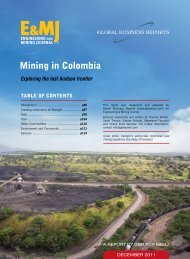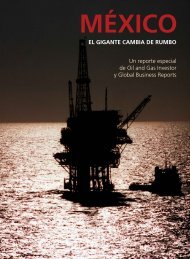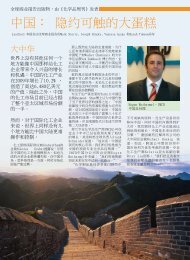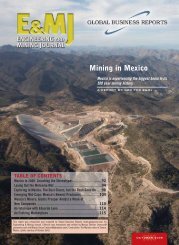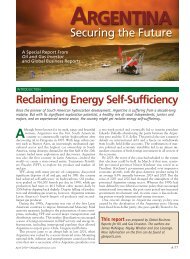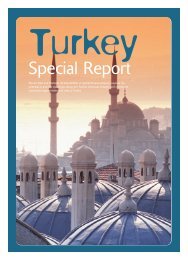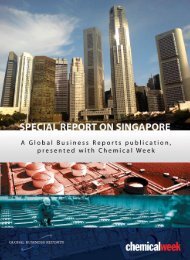Turkey Chemicals 2005 - GBR
Turkey Chemicals 2005 - GBR
Turkey Chemicals 2005 - GBR
You also want an ePaper? Increase the reach of your titles
YUMPU automatically turns print PDFs into web optimized ePapers that Google loves.
COUNTRY FOCUS: TURKEY<br />
mass to reach entry level in the market is higher than ever.<br />
Considering the sheer size of the pharmaceutical players in<br />
<strong>Turkey</strong>, one can see concentration as the only way forward.<br />
Whether this happens on a pan-national basis, or between<br />
local and international players, largely depends on what the<br />
Turkish manufacturers can bring to the deal. A strong family<br />
background for most of the local contenders implies a<br />
certain resistance to merging with organizations within<br />
<strong>Turkey</strong>, as companies have been looking at each other with<br />
a certain dose of mistrust and jealousy. These reflexes are<br />
today being erased by the necessities of the market, but nevertheless,<br />
the country has not seen many major cooperative<br />
deals between pharmaceutical operators and even if the level<br />
and quality of discussion has largely improved thanks to the<br />
role of associations like the Pharmaceutical Manufacturers<br />
Association (IEIS), the prospects of purely national mergers<br />
and acquisitions is limited.<br />
Beyond the national borders, Turkish manufacturers are<br />
attractive mainly to global players willing to have a cheaper<br />
and well located manufacturing base. In 1999, local manufacturer<br />
Ilsan Iltas was acquired by German firm Hexal.<br />
Milen, a Turkish API maker was also added to the venture,<br />
and Hexal completed the acquisition trail in 2001 with the<br />
purchase of Koz Pharmaceuticals/ Biokem.These examples<br />
show that there are many local credentials that make perfect<br />
business sense for foreign players to venture into the Turkish<br />
market. For Turkish manufacturers, to become fully fledged<br />
global partners will entail stepping up manufacturing<br />
capacities and keeping costs under check. It will also require<br />
the world to look at <strong>Turkey</strong> with new eyes and realize that,<br />
for the pharmaceutical sector too, at the crossroads of<br />
Europe, Asia and the Middle East lies a country of great<br />
promise whose true potential still remains to be tapped.<br />
Privatization process:<br />
slow motion emergency<br />
The privatization process in <strong>Turkey</strong> has never taken a<br />
smooth ride. Delays, legal challenges and other<br />
bumps in the road have punctuated the last 20 years<br />
of efforts.Today, and following the requirements of the IMF<br />
sponsored assistance package, the privisation process has<br />
been re-ignited with Turkish Airlines, Tekel, Petkim and<br />
Tüpras being some of the more well known names on the<br />
bloc. However, eleven months into the year Tupras and<br />
Petkim are already behind schedule. While Tüpras is running<br />
into legal challenges, there are indications that longdelayed<br />
Petkim seems to be going ahead and could see the<br />
first phase of its privatization completed by mid-<strong>2005</strong>.<br />
Tupras: Legal challenges<br />
The bloc tender of a 65.76% stake, owned by the<br />
Privatization Administration (PA), was held in January<br />
2004. Efremov Kautschuk GmbH and the Zorlu Group<br />
consortium submitted the highest offer at US$1.3bn (valuing<br />
the company at US$1.98bn). As a 50/50 joint foreign<br />
and domestic bid, Efremov and Zorlu seemed like ideal<br />
candidates for the purchase, however, Petrol-Is, the labour<br />
union representing the state employees, took the case to the<br />
court, arguing that the tender did not fit the legal rules and<br />
procedures as laid out by the state. Ruling on a petition<br />
lodged by the labour union, the 10th Administrative Court<br />
of Ankara ruled against the Tüpras deal, stating that not only<br />
did the bid fail to satisfy the tender convenants but that the<br />
bidding process was not competitive due to the limited<br />
number of participants.<br />
Although this legal process has been bouncing backwards<br />
and forwards since the initial award was made in January, the<br />
current ruling means that many feel that it will be at least<br />
another year before a resolution can be found.<br />
Aside from the legal implications, analysts had previously<br />
criticized the award as placing too much strain on Tatneft’s<br />
already overburdened debt pile. Efremov is the Germanbased<br />
affiliate of Tatneft, Russia's 6th major oil company.<br />
Unlike the other Russian majors, which have a core focus<br />
on Western Siberia, Tatneft’s main assets are located in the<br />
Volga-Urals region – the republic of Tataristan.According to<br />
Chemorbis, the company showed specific interest for<br />
A Global Business Reports Publication,presented with Chemical Week<br />
November 24, 2004<br />
39




